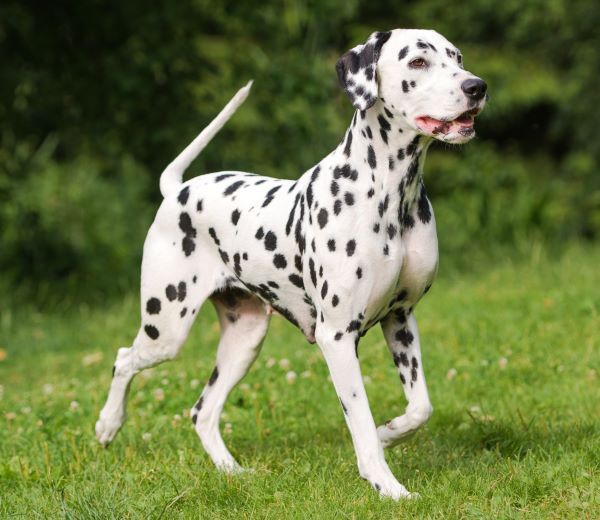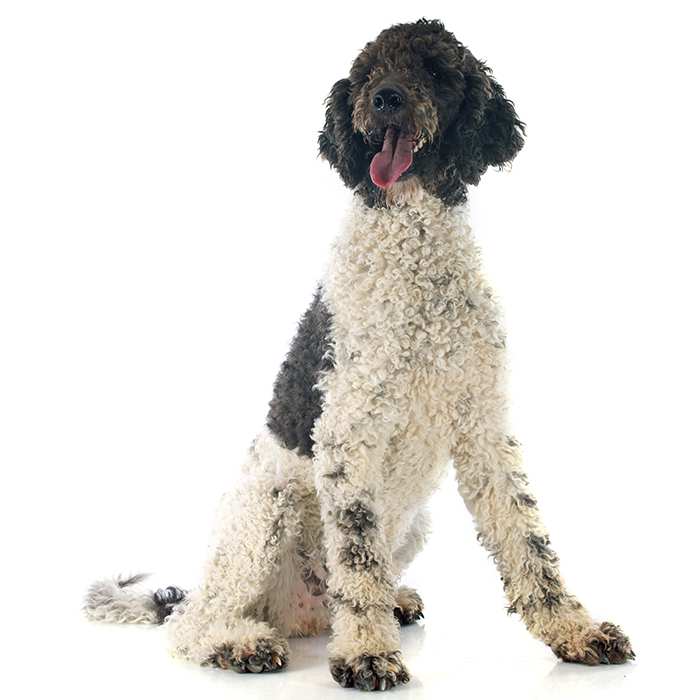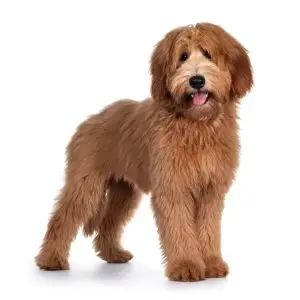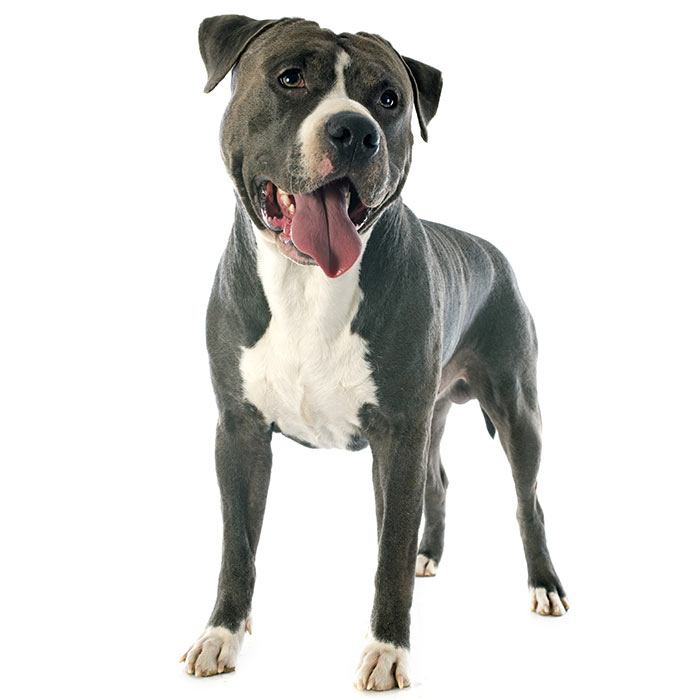Dalmatian
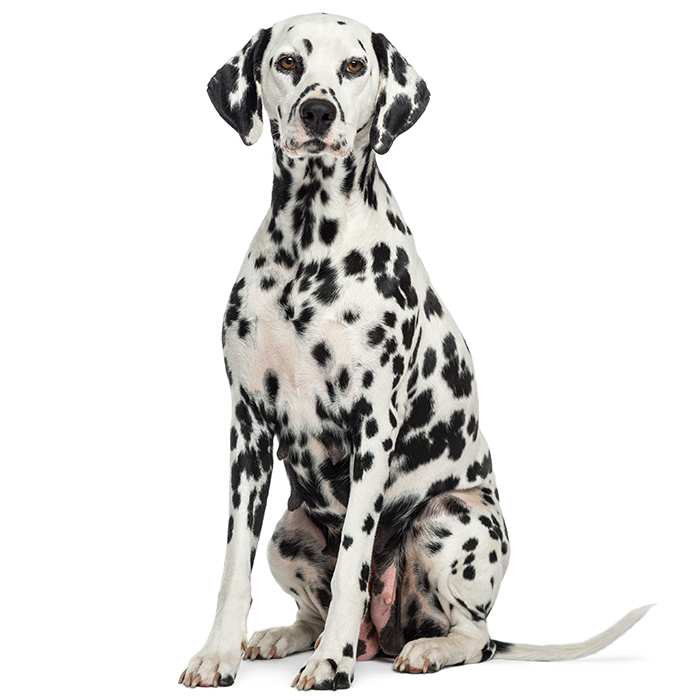

| Recommended for | Active families with older kids, singles, and couples who love outdoor activities |
| Breed Classification | Non-Sporting group |
| Other names | Firehouse Dog, Carriage Dog, Spotted Coach Dog |
| Lifespan | 10-13 years |
| Size | Medium |
| Temperament | Playful, friendly, loyal, eager to please |
| Intelligence | High; they are quick learners but can be independent, requiring consistent and positive training |
| Tendency to bark | Moderate; they may bark to alert their owners or when excited |
| Maintenance Level | Moderate grooming needs, high exercise requirements |
| Health Risk | This breed has a higher than average probability of developing health issues during its lifetime, hence the cost to insure is above average. |
Insuring a Dalmatian?
Get our award-winning Nose-to-Tail Cover with up to $30k annual benefit limit, up to 90% of eligible vet bills back, and no sub-limits.
Get a quick quote
Is this breed right for you?
Try our breed selector quiz to find out your best matching breed!
Insuring a Dalmatian?
Get our award-winning Nose-to-Tail Cover with up to $30k annual benefit limit, up to 90% of eligible vet bills back, and no sub-limits.
Get a quick quote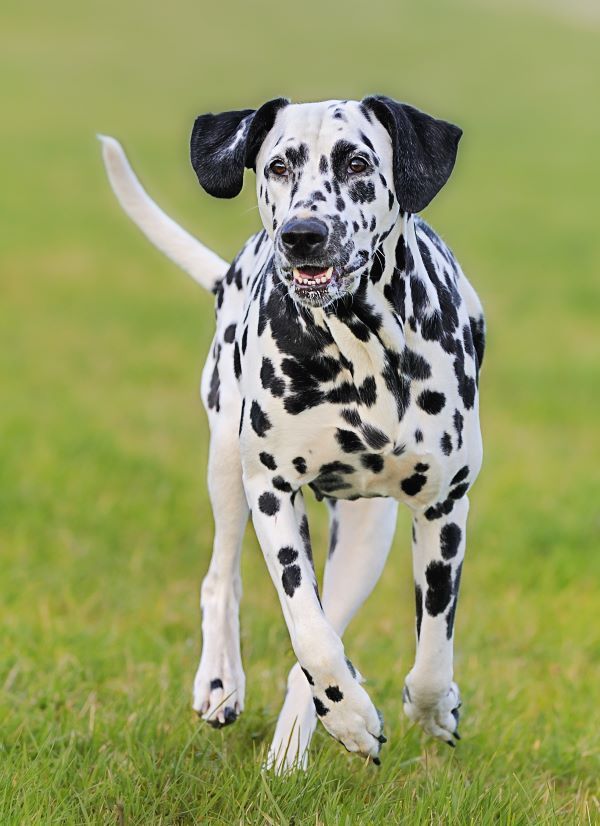
Breed history of Dalmatians
The exact origins of the Dalmatian remains a mystery. Spotted dogs have appeared in Europe, Asia, and Africa, depicted on walls of tombs, in frescos and even in letters sent from poet Jurij Dalmatin to a Bohemian duchess in 1500’s. Bands of gypsies, or Romanies, had Dalmatians so they were known in many places, but their first definitive location was Dalmatia, a region of Croatia.
The breed was also known by many nicknames, such as English Coach Dog, the Carriage Dog, Plum Pudding Dog, Fire House Dog and Spotted Dick. Used as rat catchers, shepherds, guard dogs, circus performers and coach companions, these versatile dogs’ most important role was to protect passengers and cargo during long journeys. The dogs travelled under the axle, between the lead horses, or alongside and cleared the road of stray animals.
The instinct for coaching is bred into the breed, as is their affinity with horses. In the USA, Dalmatians were popularly used as carriage dogs in horse-drawn fire engines. Though they no longer serve this purpose, they continue to be the mascot of US firehouses, and many firefighters choose Dalmatians as pets in honour of their firehouse past.
The Disney movie “101 Dalmatians” significantly increased the popularity of the breed, which led to irresponsible breeding and later abandonment issues as many owners were unprepared for the high energy demands of the breed.
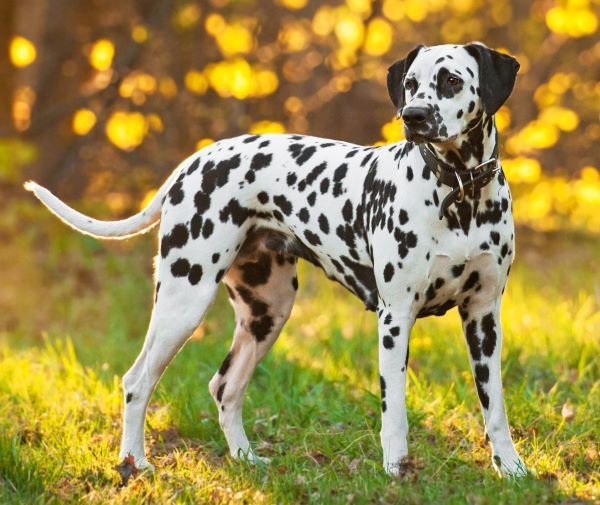
Physical description of Dalmatians
Probably the most distinctive of all breeds, the Dalmatian is a medium-sized, athletic dog with a sleek, muscular build and an iconic spotted coat. Their expressive eyes, which can be brown, blue, or even one of each, along with their black or liver-coloured noses, add to their unique and striking appearance. With their high-set ears and long, tapered tail, Dalmatians exude a sense of elegance and energy.
The hallmark of the Dalmatian is its short, smooth, single-layered white coat adorned with distinct spots, which can be black or liver. Puppies are born completely white, with their signature spots developing as they grow.
| Weight range | Female: 23–27 kg, Male: 27–32 kg |
| Height range | Female: 56–58 cm, Male: 58–61 cm |
| Colours | White coat adorned with distinct black or liver-coloured spots |
| Coat length | Short |
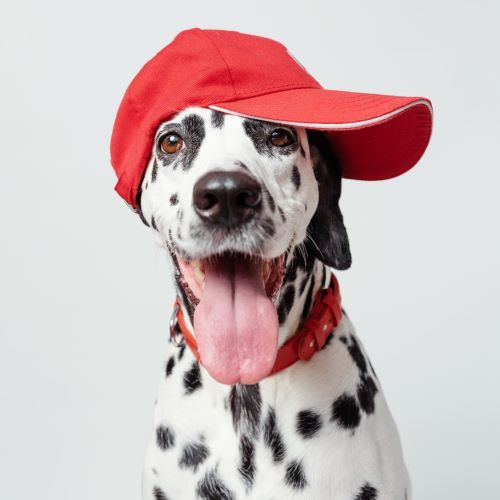
Dalmatian personality and temperament
Dalmatians are lively, sociable, and highly engaging dogs that are known for their energetic and playful personalities. Fun-loving and natural clowns, they thrive on interaction and love being part of family activities, whether it’s a long walk, a game of fetch, or simply spending time together. Their friendly and affectionate nature helps them form strong bonds with their families, making them particularly good companions for active households.
Intelligent and perceptive, Dalmatians are able to adapt to their surroundings and to different living situations, from spacious rural homes to urban apartments, provided they receive plenty of exercise and mental stimulation. While they prefer to be around their loved ones, they can entertain themselves for short periods.
Dalmatians are incredibly playful dogs with barrels full of energy and they do best with an owner who is just as energetic as they are. Happy and full of life, they can sometimes be overly enthusiastic and boisterous. If they don’t receive adequate mental and physical stimulation, they can develop behavioural issues, and without enough socialisation, they may become timid. Dalmatians who are confined to a yard or kennel away from family activities frequently become barkers or diggers.
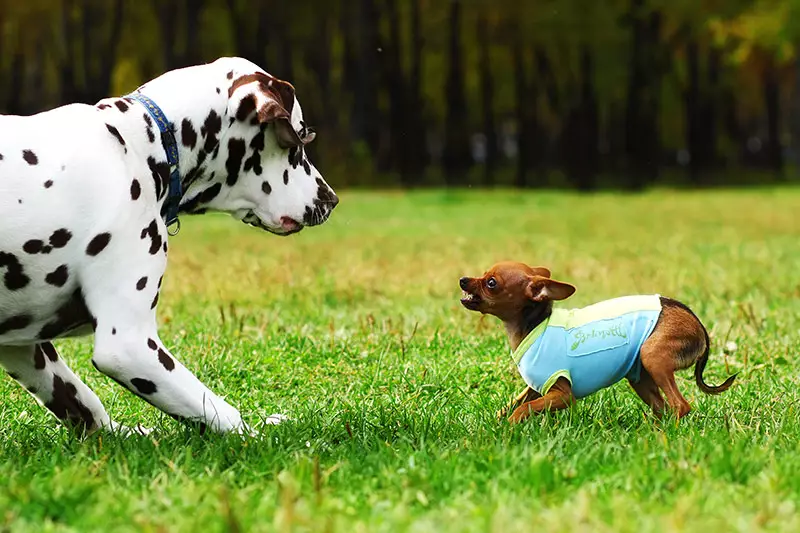
Dalmatians with kids and other pets
Because of its boisterous and energetic nature, the Dalmatian is not recommended for families with young children. Bear in mind that a Dalmatian puppy grows quickly and is incredibly active, and their size and activity level may be intimidating for toddlers.
However, they make good pets for older children. Affectionate and lively, their playful energy and patience allow them to bond well with older kids, particularly in active households where they can participate in fun activities.
When it comes to other pets, Dalmatians are typically friendly and sociable, especially if they have been well-socialised from a young age. They tend to get along well with other dogs and can often adapt to living with cats or other household animals. However, their history as a working and hunting breed may mean they have a mild prey drive, so gradual introductions and consistent training are key when introducing them to smaller pets.
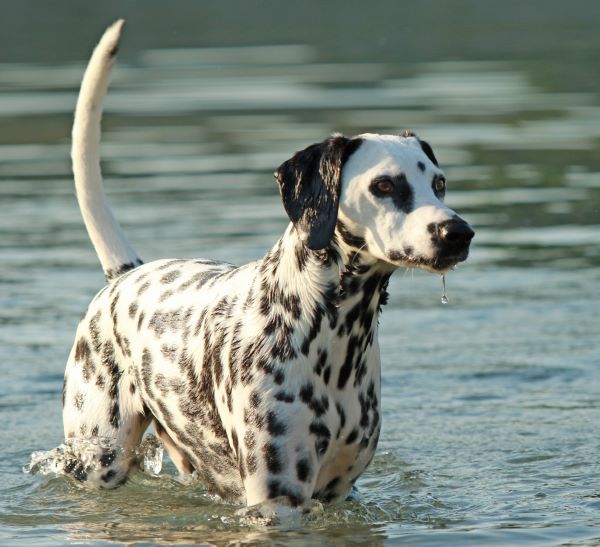
Dalmatian training and exercise
Dalmatians are high-energy dogs that require regular physical and mental stimulation to remain happy and well-behaved. Daily exercise is essential to meet their needs, with activities like brisk walks, runs, or extended play sessions being ideal. They also enjoy participating in agility, obedience training, or games that challenge their minds, such as puzzle toys or fetch. Without proper exercise and engagement, Dalmatians can become restless or develop undesirable behaviours.
Dalmatians are intelligent and quick learners, making training a rewarding experience when approached with consistency and positive reinforcement. They are keen to please, so are easy to train, however, they are often too smart for their own good and can get bored if the training is not varied. Their independent streak and tendency towards clownish behaviour means they require firm but gentle guidance to establish clear boundaries. Novice owners should definitely plan to attend a basic obedience class, while early socialisation is also crucial to help them feel comfortable around new people, pets, and environments, ensuring they grow into well-rounded companions.
| Energy level | High |
| Exercise requirements | High |
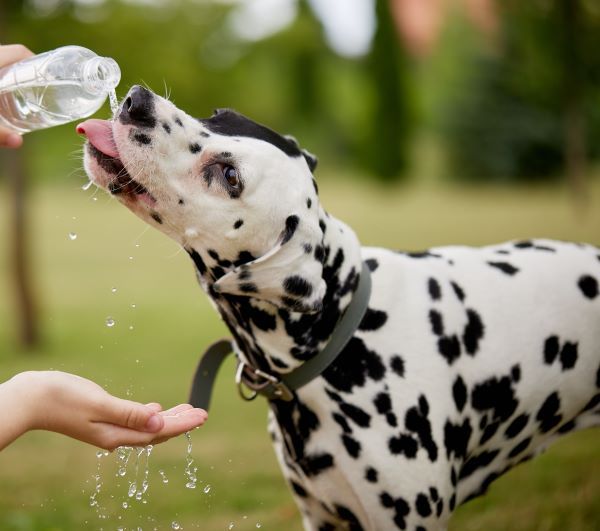
Dalmatian feeding and nutrition
Keeping your Dalmatian healthy and energetic starts with a well-balanced diet tailored to their active lifestyle. As high-energy dogs, Dalmatians thrive on high-quality food with the right mix of protein, fats, and carbohydrates to fuel their daily activities and maintain their sleek, muscular build. Their unique nutritional needs also require attention to hydration, as Dalmatians are prone to urinary issues that can be managed with proper water intake and a diet low in purines. Regular vet consultations are essential to ensure your Dalmatian is getting the nutrients they need based on their age, size, and activity level.
A Dalmatian’s dietary needs will evolve as they grow. Puppies need nutrient-dense food to support their rapid development and boundless energy, while adults benefit from a balanced diet that helps them maintain their active lifestyle. Senior Dalmatians may require lower-calorie options with added joint support to keep them comfortable and healthy in their later years. Monitoring portion sizes is key to preventing overfeeding and keeping your Dalmatian fit.
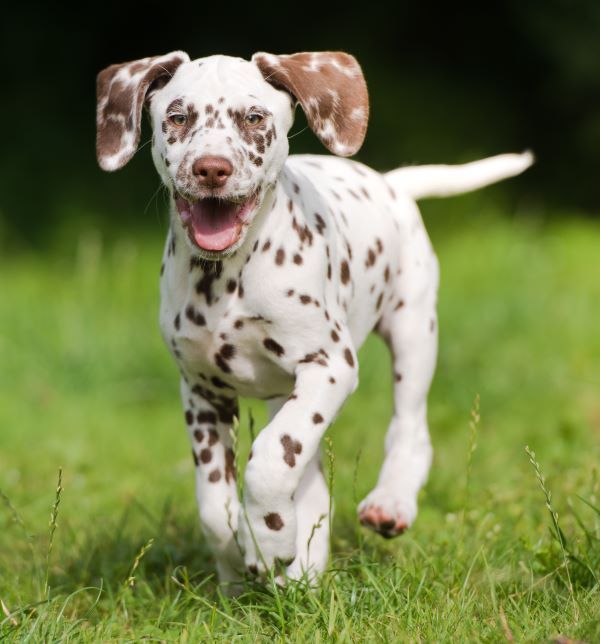
Dalmatian care and grooming
Dalmatians have a short, sleek coat that is low-maintenance but tends to shed consistently throughout the year. Their coat requires regular brushing — ideally once or twice a week — to manage shedding and keep their fur healthy and shiny. Despite their short coat, Dalmatians are not hypoallergenic, so regular grooming helps maintain its natural sheen and minimises loose hair around the home.
Grooming a Dalmatian includes more than just coat care. Their nails should be trimmed every few weeks to prevent discomfort, and brushing their teeth regularly is crucial to avoid dental issues. Dalmatians have sensitive skin, so bathing should only be done as needed, using a mild dog shampoo to avoid irritation. Checking and cleaning their ears is also important to prevent infections, especially for active dogs who spend time outdoors.
Health issues for Dalmatians
- Congenital Deafness affects a notable percentage of Dalmatians, with around 10–12% being born deaf in one or both ears. This hereditary condition is linked to the breed’s genetic makeup and unique coat pattern. Early testing using BAER (Brainstem Auditory Evoked Response) is essential to diagnose this condition. While deafness cannot be cured, consistent training and adjustments to communication methods can help Dalmatians lead happy, fulfilling lives.
- Urinary Stones are a common issue in Dalmatians due to their unique metabolism, which can lead to the buildup of uric acid and stone formation in the urinary tract. Symptoms may include difficulty urinating, blood in the urine, or frequent urination. A low-purine diet, plenty of water, and regular vet check-ups are key to managing this condition and preventing discomfort or complications.
- Hip Dysplasia can occur in Dalmatians and affects the development of the hip joint, leading to instability and eventual arthritis. This condition often results in symptoms like limping, pain, and reduced mobility. While genetics play a significant role, factors such as excessive weight or improper exercise can exacerbate the issue. Maintaining a healthy weight and following a balanced exercise routine can help support joint health.
- Skin Allergies are relatively common in Dalmatians, resulting in itchiness, redness, or irritation. These allergies can be triggered by environmental factors, food sensitivities, or grooming products. Using hypoallergenic products and monitoring for skin changes can help minimise discomfort. Regular vet consultations can assist in identifying and managing underlying causes.
- Progressive Retinal Atrophy (PRA) is a less common genetic condition in Dalmatians that causes gradual vision loss due to the degeneration of the retina. Early signs include night blindness, followed by a progressive decline in vision. Regular eye exams are recommended to monitor for symptoms and ensure early intervention.
Not all conditions are covered by Pet Insurance. For details of Bow Wow Meow Pet Insurance cover, refer to the Product Disclosure Statement.
Thinking about insuring a Dalmatian
Thinking about insuring a Dalmatian
Learn moreThinking about insuring a Dalmatian
Learn moreFree engraved pet ID tag on sign up3
Customer Satisfaction
21 day cooling off
24/7 Live Vet^ care

GapOnly® in vet claims
SEE MORE
Dalmatian Club of NSW Inc: https://www.dalmatiansnsw.com/
Dalmatian Club of Victoria: https://www.dalmatianclubofvictoria.com.au/
Dalmatian Association of Queensland: http://www.dalmatiansqld.com.au/

